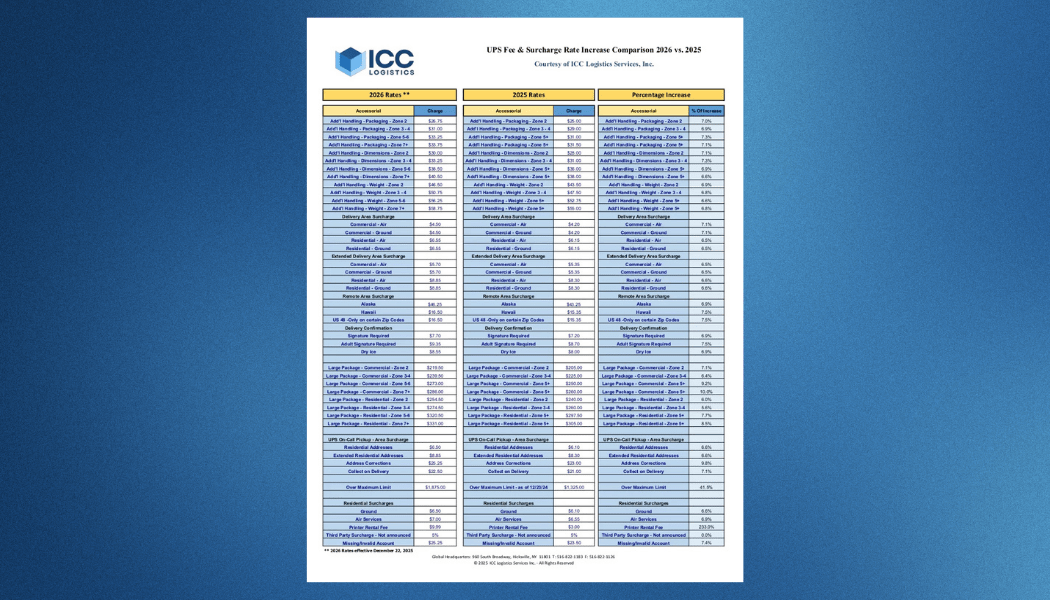When was the last time you compared your freight shipping contracts against the market? Many shippers assume that benchmarking only applies to standard LTL (less-than-truckload) or full truckload movements, but that’s a misconception.
Whether you’re managing hazardous materials, temperature-controlled freight, oversized cargo, or custom-packaged goods, benchmarking can be one of the most powerful tools for improving freight contract performance. By examining how your agreements align with current market trends, you can uncover cost inefficiencies, improve service outcomes, and strengthen your position at the negotiation table.
What Freight Benchmarking Really Means
Freight benchmarking goes beyond simply comparing rates; it’s a strategic evaluation of how your transportation spend, operational results, and contractual terms measure up against industry standards. It’s a continuous process designed to help businesses identify inefficiencies and uncover cost opportunities hidden in plain sight.
A comprehensive freight benchmark typically evaluates several dimensions:
- Contract structure: Reviewing how discounts, penalties, and terms compare to prevailing market norms to identify exceptions or outdated clauses.
- Lane-level spend analysis: Evaluating rate variance by geography, volume, or mode to locate cost drivers and prioritize high-impact savings areas.
- Service-specific clauses: Examining charges like guaranteed delivery windows, specialized handling, or detention terms that may differ significantly from peer benchmarks.
By leveraging aggregated, anonymized market data from comparable shippers, you can quickly see how your agreements stack up. This comparison helps you identify whether you’re on par with your peers or paying a premium without added value. Ultimately, benchmarking builds a foundation of data-driven insight that supports smarter contract management and measurable ROI.
The Difference Between Standard vs. Specialized Cargo Contracts
Standard freight contracts, typically used for LTL and truckload shipments, follow predictable structures with established base rate tiers and straightforward discounts based on volume or frequency. Specialized freight agreements, however, are far more variable because they must account for custom equipment, handling, and compliance requirements specific to the cargo being moved.
Some unique cost components often found in specialized freight contracts include:
- Equipment or handling premiums: Costs associated with liftgates, flatbeds, refrigerated units, or cranes.
- Custom accessorial charges: Hazmat handling, temperature monitoring, protective covering, or securement fees.
- Routing or packaging requirements: Special loading/unloading instructions or packaging protocols.
- Variable surcharge triggers: Exception-based surcharges tied to circumstances such as weather, volume surges, or route restrictions.
These complexities can make benchmarking appear challenging, but they actually underscore its importance. The key is establishing a “like-for-like” basis for comparison, evaluating your specialized freight agreements against peers with similar commodities, equipment needs, and service requirements. Contextual benchmarking removes noise from the analysis and ensures any cost gap identified is truly meaningful.
Data Points You Should Always Benchmark
To gain an accurate and actionable picture of your transportation performance, benchmarking should include both financial and operational data points. A narrow focus on rates alone can lead to misleading conclusions. Instead, a comprehensive benchmark should examine the entire cost structure and service delivery profile.
At a minimum, you should assess:
- Base rate levels across all modes, zones, and service categories.
- Fuel surcharge mechanisms, including index formulas and frequency of adjustments.
- Accessorial fees such as detention, layover, inside delivery, and liftgate charges.
- Minimum charges and net effective discounts after all rebates, incentives, and penalties are applied.
- DIM (dimensional weight) factors and special surcharges that may affect billing accuracy.
- Performance metrics include on-time delivery rates, damage claims, and penalty structures.
Benchmarking these metrics reveals hidden costs that often slip through without consistent review. For instance, one client’s analysis showed that outdated surcharge indexes led to a 9% overpayment on lanes that hadn’t been audited in three years. Such insights are impossible to uncover without structured benchmarking and data visibility.
How Audit Data Strengthens Negotiation Power
Freight auditing and benchmarking are two sides of the same coin—each reinforces the other to deliver a clearer financial picture. When used together, they help shippers understand not only what was negotiated but also what was actually billed and paid.
The process generally answers three fundamental questions:
- What did you agree to? A review of contracts, terms, and negotiated rate structures.
- What did you pay? Verification through invoice-level audit data to confirm carrier compliance.
- What are others paying? Comparative data to assess competitiveness across similar profiles.
Audit-driven benchmarks expose patterns such as repeated billing discrepancies, misapplied surcharges, or unclaimed credits. When brought into contract negotiations, these findings carry substantial leverage. A shipper who can demonstrate quantified overcharges or performance deviations is in a far stronger position to secure concessions from carriers or adjust contract terms. At ICC Logistics, decades of combined audit and benchmark analysis have routinely uncovered double-digit cost reductions simply by aligning real-world billing with negotiated terms.
Tools and Partners That Support Freight Benchmarking
Building an effective benchmarking program is data-intensive and analytically complex. Many organizations find value in partnering with specialized logistics firms that combine proprietary databases, analytics software, and experienced consultants. The right partnership saves internal resources and ensures consistent accuracy across your spend categories.
Recommended tools and supports include:
- Proprietary benchmarking databases: Repositories of historical rate and performance data, such as ICC’s 50+ years of datasets, can establish credible benchmarks by industry and mode.
- Mode-specific analysis tools: Platforms built for parcel, LTL, truckload, ocean, or air freight to ensure clean, apples-to-apples evaluations.
- Audit-integrated platforms: Systems that tie live invoice data into contract benchmarks to verify savings opportunities and compliance in real time.
- Consulting insight: Analysts who understand carrier pricing logic and can interpret the unique cost behavior in your supply chain segment.
When expert interpretation is layered onto technology, benchmarking transforms from a static report into a living intelligence tool. That synergy helps organizations not only identify cost gaps but also act swiftly to close them—through re-tendering, renegotiation, or network optimization.
Why Benchmarking Matters for Specialized Cargo
Shippers of specialized or high-value cargo can no longer regard their contracts as a mystery category reserved for niche expertise. Because these shipments often command higher margins for carriers, even slight pricing misalignments can represent substantial cost exposure over time. Benchmarking specialized freight ensures that your service premiums remain justified and market-appropriate.
For logistics managers overseeing sensitive freight, from perishable goods to industrial machinery, benchmarking provides transparency that mitigates financial risk. Instead of relying on anecdotal justifications from carriers, the discussion becomes grounded in empirical data and peer comparisons.
This approach builds confidence, improves forecasting accuracy, and fosters stronger carrier partnerships rooted in accountability and mutual gain.
Frequently Asked Questions
What is freight benchmarking, and how does it work?
Freight benchmarking is a data-driven comparison of your transportation rates and contract terms against aggregated industry averages. It highlights variances that signal potential overpayment or performance shortfalls. Analyses typically draw from anonymized data of similar shippers to deliver relevant insights.
Can specialized cargo contracts be benchmarked effectively?
Absolutely. Effective benchmarking targets comparable shipments by commodity, handling requirements, and shipping mode. When similar freight profiles are used as the reference group, specialized contracts can be benchmarked with precision and confidence.
What data points should I focus on?
Prioritize base transportation rates, accessorial charges, fuel index formulas, and minimum charges. These variables form the majority of cost impact and determine total landed costs within specific corridors or service levels.
How does audit data help with negotiations?
Audit data validates billing accuracy and ensures that carriers adhere to contractual terms. When combined with benchmarking, it allows you to negotiate using evidence-based insights rather than assumptions, enabling improved contract terms and verifiable savings opportunities.
What tools are best for specialized benchmarking?
Advanced freight benchmarking databases, integrated audit platforms, and data-driven consulting support allow for high-precision benchmarking even in complex logistics environments. ICC’s proprietary analysis platform combines these capabilities under one framework for accurate, time-efficient results.
What makes benchmarking different from rate comparison?
While a rate comparison is a one-dimensional look at price points, benchmarking provides a holistic analysis that incorporates contract terms, historical behavior, service levels, and carrier compliance data, offering a complete picture of freight competitiveness.
Take the Next Step: Evaluate Your Contracts with ICC Logistics
For over fifty years, ICC Logistics has specialized in helping companies understand and optimize their freight and parcel spend. Our benchmarking and audit services are designed to bring clarity, cost control, and confidence to your logistics strategy. Whether your business ships standard commodities or highly specialized products, we align your agreements with best-in-class market data and proven negotiation frameworks.
If your current freight costs seem increasingly opaque or you suspect hidden spend in your specialized shipments, it’s time to benchmark your contracts. ICC’s logistics experts can identify inefficiencies, recover lost value, and guide you through data-backed renegotiation to achieve sustainable savings and improved carrier relationships.
Benchmarking transforms freight management from reactive oversight into a proactive, data-driven discipline. No matter the complexity of your cargo, knowing how your contracts perform in the broader market empowers better decisions. With expert insight and verified data, ICC Logistics helps you move from uncertainty to strategic advantage, one benchmark at a time.
Get Immediate Bottom Line Impact with a Risk-FREE ICC Logistics Benchmark Assessment



 to receive our FREE white papers:
to receive our FREE white papers: